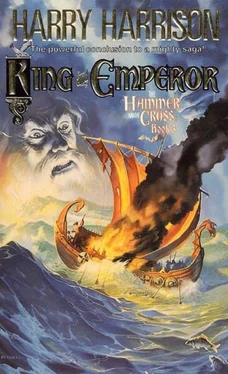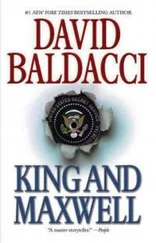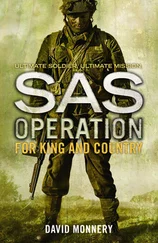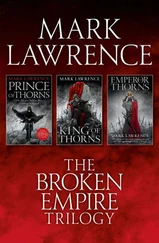Opening doors, raised voices, a shuffle of feet, said that the conference of Pope and Patriarch had broken up, that the Emperors of East and West must turn their minds again to ceremonial and treaties. Bruno groped for a reply, amid several. The Basileus is an Easterner, he thought, like Pope Nicholas whom we killed. He does not realize that destiny lies in the West. He does not know that the Way-folk are not the greedy children bought off in his father's time. That they are worse than the followers of the Prophet, for they still have their prophet with them: the one-eye. I should have killed him when I had my sword at his throat.
And yet maybe there is no need to argue here. The Basileus needs my bases. I need his fleet. Not for the Arabs. Just to sweep the Channel so I can put my lancers across. But let him have his way first. For he has the one thing that the Way-folk do not…
The Emperors were on their feet, the churchmen approaching, all smiles. A cardinal spoke, bowing, the cardinal who had once been Archbishop Gunther of Cologne. He spoke in fluent Low German, his and Bruno's native dialect, which neither Pope nor Patriarch nor any Greek or Italian would follow. At the same time one of the Patriarch's staff broke out with a burst of demotic Greek, no doubt with the same intention.
“It's fixed. They have agreed that we may add the formula ‘and the Son’ to the Nicene Creed—much difference that makes—as long as we draw no conclusions about the Double Procession of the Holy Ghost from it. Our fool, the Italian, has been told he has to withdraw his bishops from the Bulgars and let Saint Cyril have a free hand teaching them to read and write. All sides have agreed in condemning the former Patriarch, Photius the bookworm, no problem there. It's fixed.”
Bruno turned towards Basil as the latter heard his own secret briefing chatter to an end. The two men smiled, simultaneously, reached out their hands.
“My bases in Italy,” said Bruno.
“My fleet to relieve Sicily. And then the whole Italian Sea,” replied Basil.
And then the Atlantic, thought Bruno. But he held his tongue. After all he might have shed the Greeks and their Emperor before then. If he or his agents could find out the weapon that held Constantinople inviolable from the sea. The secret no Westerner knew, Roman or German or Way-man.
The secret of Greek fire.
Halim, amir of the fleet of the Fortunate of God, bin-Tulun, Caliph of Egypt, newly independent of the feeble Caliphate of Baghdad, felt no unease as his galley led its hundred fellows to sea in the darkest hour before dawn. In moments, when a keen eyesight could see sufficiently to distinguish a white thread from a black one, his muezzin would call the faithful to prayer with the traditional cry, the shahada:
God is most great!
I testify that there is no God but Allah.
I testify that Muhammad is the messenger of Allah.
Arid so on, in the invocation that Halim had heard and repeated and obeyed forty thousand times since he reached the estate of a man and a warrior. He and his men would stretch out their mats on the rolling decks and go through their rakat , the prescribed ritual of prayer. But the men at the oars would not, would carry on sweeping his fleet into battle. For they were Christians, the slaves of many a lost campaign. Halim had no doubt of the outcome of this one. His soldiers were fed and rested, his slaves watered and refreshed. By the end of the summer the disorganized resistance of the Rumi would have come to an end, as always. And this time the whole island of Sicily would be brought once more under the rule of his master, and beyond his master the rule of the Dar al-Islam , the House of Submission to the Will of God.
Halim heard the call of the lookout simultaneously with the start of the ritual prayer, the salat . “Ships to seaward of us! Ships with the light behind them!”
It angered him, but it did not surprise him or cause him uneasiness. Over the years the Christians, those who added gods to God, had learned the rituals of their enemies, and sought from time to time to make use of them. They were mistaken in thinking that an advantage. In combat for the Faith, to abstain from prayer was permissible, even meritorious. It could be made up later. If the Rumi were trying to take him by surprise, they only brought their own end so much the closer.
Halim called to his steersman to swing the ship towards the dawning light, heard the master of the slaves shout orders to the port oars to cease rowing, then to accelerate to ramming speed. Halim's vessel was one of the ancient pattern that had ruled the Mediterranean Sea, the Italian Sea as the foolish Rumi called it, since the days of the Greek philosophers before the son of the Lady Miriam came to trouble the world. Long, thin, with little freeboard, it was heavily reinforced forward to take an iron-shod ram, with catwalks above the oarsmen's benches for the fighting men to line either side.
Halim did not rely on his ram alone. His master, bin-Tulun, was no Arab by blood, but a Turk from the central steppe lands of Asia. He had supplied a dozen of his countrymen to each ship. As they lined the sides they began to string their bows: the composition bows of Central Asia, wood at the center, sinew on the outside, the side to which the bow bent before it was strung, hard horn on the inside, all glued and assembled with fanatic care. Again and again Halim had seen the Rumi shot down before ever they came to a handstroke, their own weak wooden bows outranged by a hundred yards, not able to pierce even good stout leather.
As the light grew across the water Halim realized that the ships now closing on him at ramming speed like his own were not the kind he expected. Their prows were painted red, were higher out of the water than any he had seen before, and from the warships' hulls he could see sprouting not the crucifixes of the Rumi , but gilded pictures, icons.
Not the fleet of the Sicilians then, or their holy father in Rome, but the Red Fleet of the Byzantines, of which Halim had only heard. He felt something at his heart—not fear, for that was impossible to the true believer, nor even surprise, but intellectual worry: how could the Byzantine fleet be here, five hundred miles from its bases, more days than it could row without exhaustion? Concern, as well, that this news and what it meant should be passed to his master.
But passed it would be. Halim signaled to his steersman not to meet the charging enemy bow to bow, but to swerve aside, trusting to greater handiness, to shave away one row of oars as they passed, and pour in a deadly volley from his bowmen, each of them able to shoot a shaft a second and never miss. He ran forward himself along the starboard catwalk, drawing his saber, not with the intention of striking a blow but to encourage his men.
There would be a moment of danger here. For as he turned aside, the Greek, if he were fast enough, could accelerate and strike bow to flank, driving through below the waterline, and reversing oars instantly to shake the smaller craft off and leave her crew struggling in the water, her chained slaves drowning desperate and trapped.
Yet the slaves knew that too. As the ship swung barely fifty yards from the white water of her enemy's prow, the starboard side braked with their oars as one man, the port side slaves swung with all the strength in their bodies. Then a concerted momentary glance from both sides at each other to pick up the time, and the ship leapt forward as if it were the first stroke that any man had made that day. The bowmen bent their bows and picked their targets among the faces crowding the rail.
Читать дальше











